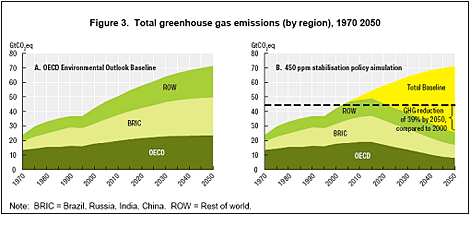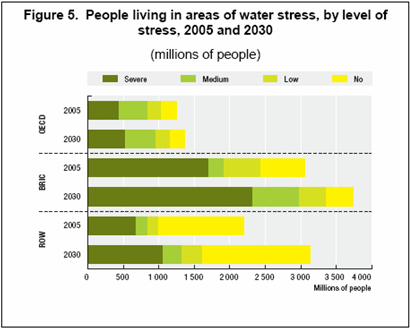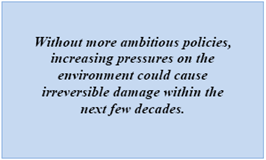Global Sustainability - We Can Do It!
These challenges - climate change, biodiversity loss, water scarcity, pollution and toxic chemical poisoning, can be overcome through international cooperation, policy reform and market assistance.
Presenting the 520-page outlook, OECD secretary-general Angel Gurría, said the report paints "a grim picture of our planet in 2030 if no policy reforms are introduced".
"Solutions to the key environmental challenges are available, achievable and affordable, especially when compared to the expected economic growth and the costs and consequences of inaction", said Gurría at the worldwide launch of the Environmental Outlook in Norway.
The 2008 Environmental Outlook combines economic and environmental projections for the next few decades with simulations of specific policies to address the key challenges. It identifies four priority areas where urgent action is needed: climate change, biodiversity loss, water scarcity and the impact on human health from pollution.
"The Outlook is an impressive body of work. It combines hope for the future with an urgent call for action today. It offers important guidance for decision-makers and integrates economic and environmental analysis", said Norway’s Prime Minister, Jens Stoltenberg, who hosted the launch of the report.
But the 2008 OECD Environmental Outlook also said that the alternative to this ‘grim’ future and solutions to the planet’s environmental challenges are both available and affordable.
The OECD, a 30-nation body dedicated to the spread of democracy and market economies, predicts world GDP will almost double by 2030 and notes that it would cost just over 1% of that growth to implement environmental safeguards, slowing world economic growth by about 0.3% a year. That would mean that by 2030, the world economy would grow by 97% if recommended action was taken to protect the environment instead of growing by 99% if no action is taken.
Consequences
The environment and economy are forever linked and in the long-term the state of the environment and natural resources directly affect economic development. According to the report, ‘competition for scarce natural resources, harvesting of some renewable resources such as fish stocks and tropical timber, the impacts of changing climate on agricultural production, energy prices, the search for alternative energy sources, and others, may heavily influence trade and investment patterns in the coming years’.
As conventional energy continues to pollute the air and inadequate resource management provides diminishing returns on water and land quality and resource availability, the potential for an economy to persist and grow increasingly destabilizes.

If no new policy actions are taken, within the next few decades there is a risk of irreversibly altering the environmental basis for sustained economic prosperity says the report.
Economic-environmental projections of the report show that world greenhouse gas emissions are expected to grow by 37% to 2030 and by 52% to 2050 if no new policy action is introduced. To meet increasing demands for food and biofuels world agricultural land use will need to expand by an estimated 10% to 2030; 1 billion more people will be living in areas of severe water stress by 2030 than today; and premature deaths caused by ground-level ozone worldwide would quadruple by 2030.

"Without new policies, global greenhouse gas emissions are projected to increase by over 50% to 2050. This could cause the global temperature to rise above pre-industrial levels by a range of 1.7-2.4° by 2050," Gurría noted.
Turning it Around
The Outlook makes several recommendations which could turn around the emerging global environmental collapse. Similar to sentiments in other recent reports, published by the United Nations, the Outlook identifies that international cooperation, swift policy action, market support and investment choices are the key elements in diverting catastrophe.
The following actions are essential:
- Use a mix of complementary policies to tackle the most challenging and complex environmental problems, with a strong emphasis on market-based instruments, such as taxes and tradable permits, in order to reduce the costs of action.
- Prioritize action in the key sectors driving environmental degradation: energy, transport, agriculture and fisheries. Environmental ministers cannot do this alone. Environmental concerns need to be integrated into all policy-making by relevant ministries including finance, economy and trade, and reflected in all production and consumption decisions.
- Ensure that globalization can lead to more efficient use of resources and the development and dissemination of eco-innovation. Business and industries need to play a lead role, but governments must provide clear and consistent long-term policy frameworks to encourage eco-innovation and to safeguard environmental and social goals.
- Strengthen international environmental governance to better tackle trans-boundary and global environmental challenges.
- Strengthen attention to the environment in development co-operation programmes, and promote more coherent policies.

Most importantly the report emphasizes that developed nations will need to work closely with emerging economies, particularly Brazil, Russia, India and China given their growing influence in the world economy and increasing share of global environmental pressures. By 2030 the annual emissions of these four nations together will exceed those from all 30 OECD countries combined.
Improving environmental co-operation between OECD and non-OECD countries can help spread knowledge and technological best practices.
"Countries will need to shift the structure of their economies in order to move towards a low carbon, greener and more sustainable future. The costs of this restructuring are affordable, but the transition will need to be managed carefully to address social and competitiveness impacts and to take advantage of new opportunities," Gurría said.
Repeating Message
The message in the Outlook is the latest in a string of publications identifying such solutions as necessary, feasible and affordable.
In November of 2007 the United Nations Intergovernmental Panel on Climate Change released the Synthesis Report, an amalgam of three climate change reports which describe how mitigating climate change is within our capabilities.
The report stated that there are many opportunities associated with climate change mitigation that not only could lead to the betterment of the environment, but also could generate significant economic and financial benefits.
According to the Synthesis report, stabilization levels of global warming can be achieved by the deployment of technologies that are either currently available or expected to be commercialized in coming decades. An effective market approach would also help unleash significant mitigation potential in all sectors.
In February, 2008 the United Nations Environmental Program published the 2008 UNEP Yearbook which highlighted the need for international collaboration and policy which promoted environmental market growth and activity.
You can return to the main Market News page, or press the Back button on your browser.

